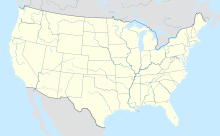| Bundy standoff | |||
|---|---|---|---|
| Date |
| ||
| Location | 36°43′00″N 114°14′19″W / 36.716574°N 114.238483°W | ||
| Caused by |
| ||
| Goals |
| ||
| Resulted in |
| ||
| Parties | |||
| |||
| Lead figures | |||
| |||
The 2014 Bundy standoff was an armed confrontation between supporters of cattle rancher Cliven Bundy and law enforcement following a 21-year legal dispute in which the United States Bureau of Land Management (BLM) obtained court orders directing Bundy to pay over $1 million in withheld grazing fees for Bundy's use of federally owned land adjacent to Bundy's ranch in southeastern Nevada.
On March 27, 2014, 145,604 acres (589 km2) of federal land in Clark County were temporarily closed for the "capture, impound, and removal of trespass cattle." BLM officials and law enforcement rangers began a roundup of such livestock on April 5, and Cliven Bundy's son, Dave, was arrested.[2] On April 12, 2014, a group of protesters, some of them armed, approached the BLM "cattle gather." Sheriff Doug Gillespie negotiated with Bundy and newly confirmed BLM director, Neil Kornze, who elected to release the cattle and de-escalate the situation. As of the end of 2015, Cliven Bundy continued to graze his cattle on federal land and still had not paid the grazing fees.
The ongoing dispute started in 1993, when, in protest against changes in grazing rules, Bundy declined to renew his permit for cattle grazing on BLM-administered public lands near Bunkerville, Nevada.[3] According to Bundy, the federal government lacks the constitutional authority to own vast tracts of lands, an argument repeatedly rejected by federal courts. According to the BLM, Bundy continued to graze his cattle on public lands without a permit. In 1998, Bundy was prohibited by the United States District Court for the District of Nevada from grazing his cattle on an area of land later called the Bunkerville Allotment. In July 2013, federal judge Lloyd D. George ordered Bundy to refrain from trespassing on federally administered land in the Gold Butte area of Clark County.
Cliven and his son Ammon Bundy, and their supporters, have claimed that the federal government lacks the authority to manage public lands. These arguments have been repeatedly rejected by legal scholars and federal courts, including the U.S. Supreme Court; the property clause of the United States Constitution grants plenary authority to Congress to manage federal property, including land.[4][5][6]
- ^ Knapp, George; Lauren Rozyla. "BREAKING NEWS: BLM ends roundup of Bundy cattle". KLAS-TV Las Vegas. Archived from the original on May 24, 2015. Retrieved April 12, 2014.
- ^ "Bundy's Federal Feud: Timeline of Events". Las Vegas Review-Journal. January 28, 2016. Retrieved April 4, 2018.
- ^ Cite error: The named reference
CourtOrder1998was invoked but never defined (see the help page). - ^ Cite error: The named reference
HCNLawwas invoked but never defined (see the help page). - ^ Public Land Transfer Laws: Not Constitutional Then, Not Constitutional Now Archived October 8, 2017, at the Wayback Machine. Graybill, Raph. American Constitution Society, 11 March 2015
- ^ Are U.S. Public Lands Unconstitutional?. John D. Leshy, Hastings Law Journal vol. 69:499


